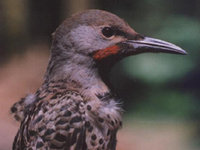 Here the naturalist John Burroughs publishes the account of a young correspondent who has tamed a high-hole (a.k.a. yellow flicker, northern flicker, Colaptes auratus). The information about the behavior of the bird and the amusing narrative of the adventures of man and bird are of a quality almost impossible to come by.
Here the naturalist John Burroughs publishes the account of a young correspondent who has tamed a high-hole (a.k.a. yellow flicker, northern flicker, Colaptes auratus). The information about the behavior of the bird and the amusing narrative of the adventures of man and bird are of a quality almost impossible to come by.A young farmer in the western part of New York, who has a sharp, discriminating eye, sends me some interesting notes about a tame high-hole he once had.
"Did you ever notice," says he, "that the high hole never eats anything that he can not pick up with his tongue? At least this was the case with a young one I took from the nest and tamed. He could thrust out his tongue two or three inches, and it was amusing to see his efforts to eat currants from the hand. He would run out his tongue and try to stick it to the currant; failing in that, he would bend his tongue around it like a hook and try to raise it by a sudden jerk. But he never succeeded, the round fruit would roll and slip away every time. He never seemed to think of taking it in his beak. His tongue was in constant use to find out the nature of everything he saw; a nail-hole in a board or any similar hole was carefully explored. If he was held near the face he would soon be attracted by the eye and thrust his tongue into it. In this way he gained the respect of a number of half-grown cats that were around the house. I wished to make them familiar to each other, so there would be less danger of their killing him. So I would take them both on my knee, when the bird would notice the kitten's eyes, and, leveling his bill as carefully as a marksman levels his rifle, he would remain so a minute, when he would dart his tongue into the cat's eye. This was held by the cats to be very mysterious: being struck in the eye by something invisible to them. They soon acquired such a terror of him that they would avoid him and run away whenever they saw his bill turned in their direction. He never would swallow a grasshopper even when it was placed in his throat; he would shake himself until he had thrown it out of his mouth. His 'best hold' was ants. He never was surprised at anything, and never was afraid of anything. He would drive the turkey gobbler and the rooster. He would advance upon them holding one wing up as high as possible, as if to strike with it, and shuffle along the ground toward them, scolding all the while in a harsh voice. I feared at first that they might kill him, but I soon found that he was able to take care of himself. I would turn over stones and dig into ant-hills for him, and he would lick up the ants so fast that a stream of them seemed going into his mouth unceasingly. I kept him till late in the fall, when he disappeared, probably going south, and I never saw him again."
The Writings of John Burroughs. Houghton Mifflin: Boston and New York, 1905. "Sharp Eyes". IV, 39-41.
Also from the Library of Babel:
- Pierce Butler, Fanny Kemble, et al. July 22, 2020. ‘“An attempt of the Pennsylvania Supreme Court to make a way around the original Fugitive Slave Law, of 1793, by finding a private agent guilty of kidnapping for having remanded a slave from Pennsylvania to Maryland was forcefully overturned by the U. S. Supreme Court in Prigg v. United States (1842).”’
- Burroughs Hears the Bobolink's New Note. As the naturalist John Burroughs seems to have been well aware, bird-songs change and evolve over time.
- Burroughs Observes a Gourmet Robin. The naturalist John Burroughs marvels over a robin with a curious menu item.
- Be sure to check out the Browser's Guide to the Library of Babel.


No comments:
Post a Comment